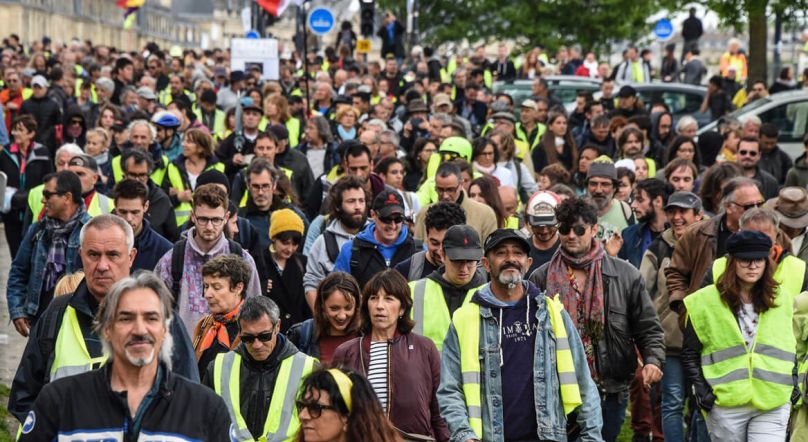
According to Andrew Sheng, distinguished fellow of AGI, "From the ‘yellow vest’ protests in France to the anti-extradition demonstrations in Hong Kong, race and identity lie at the heart of the recent wave of populism. Such is the outcome when economic inequalities aren’t tackled early enough."
July 14 is celebrated in France as Bastille Day, on which day 230 years ago, French peasants stormed the Bastille prison in Paris and sparked the French Revolution. Thus began the populist movement that overturned the ancien régime of monarchy and replaced it with the popular creeds of liberty, equality and fraternity.
When asked his view of the revolution in 1972, the late Chinese premier Zhou Enlai famously said it was too early to tell. It later transpired that the question was asked of the 1968 Paris student uprising instead. Still, the French-trained Zhou had been an active part of the Chinese students’ revolt in Lyon in 1921, and the Communist Party of China, which was born out of student protests, has a deep understanding of how protests work.
France celebrated Bastille Day this year with a show of military might, as if it was needed to deal with the “yellow vest” protests. Perhaps they remember the revolution’s violent history. During the Reign of Terror from 1793-94, many noblemen and “enemies of the people” were publicly tried and guillotined. Domestic order was restored only after Napoleon seized power and spent the next 20 years fighting Britain and the rest of monarchic Europe.
Is populism defined by economics or culture? Since the 2016 Brexit referendum, experts have sought to understand populism, the mass movement with anti-elite, authoritarian and often nationalist elements rooted in economic insecurity and identity politics.
If it is simply about economics, then Harvard professor Dani Rodrik thinks the right policies can deal with inequalities and regional imbalances. But if it is about culture and values, then there are fewer policy options and it is tougher to solve.
The real problem is that even if good policies are available, the politics may have become too polarised. To prevent populism from sliding into chaos, careful diagnosis is needed to map the way towards reconciliation, compromise and rebuilding of trust.
What France’s ‘yellow vests’ can teach Hong Kong activists
The American democracy, for example, is dysfunctional, argues Professor Julia Azari, because of three legacy deficiencies. First, political issues exist largely at the national level but voting remains at the local level, so the older, rural white population is endowed with more Senate seats than the urban, increasingly racially mixed voters.
Second, party politics has become dramatically polarised, with the Republican Party increasingly willing to take hostile measures to prevent Democrat reforms and block judicial appointments along ideological lines, often favouring the rich, but also espousing a Judeo-Christian fervour.
Third, race remains a divisive factor, as shown by President Donald Trump’s tweets asking four non-white Democrat Congresswomen to leave America and “go back” home – which earned a rare Congress rebuke.
The issues of race, religion and identity lie at the heart of recent populism. Like in the US, the rise of the right wing in populist politics in Britain and Europe reflect these identity issues.
At the Brexit referendum, many among the young, who would have preferred to remain in the European Union, did not vote, whereas many in the older generation voted to leave. The preference for British identity and sovereignty meant an underlying resentment of the loss of sovereignty to the European Commission. It is a deep-seated concern held by the 170,000 mostly white and older members of the Conservative Party, which will decide not just the next prime minister, but also the fate of Brexit negotiations.
Why Brexit may be the least of the EU’s worries
In Europe, ethnic and religious factors underlie the fears of right-wing conservatives, who have also spoken up about their loss of economic sovereignty to Brussels, as well as about fears of being overwhelmed by immigrants from North Africa and the Middle East. The Hungarian and Italian right-wing parties, for example, are more comfortable with working with Russia and more strongly against immigration. Even as Europe struggles to revive economic growth, how to hold Europe together as populist interests diverge parallels the divide between local politics and national interests.
This divide exists also in Hong Kong. It is clear that after 156 years of colonial rule, there are cultural differences between Hongkongers and mainlanders. The recent protests in Hong Kong reflect deep identity differences that must be resolved before the “one country, two systems” mandate expires in 2047.
Both the mainland and the Hong Kong community must arrive at a new social understanding on how to stay together as one nation that can also accommodate diverse opinions and cultural differences.
Azari’s analysis of the national-local divide excludes the geopolitical dimension. Globalisation has already begun to erode national sovereignty as defined by the 1648 Westphalian treaties, because of rapid spread of knowledge and trade. Nevertheless, governments continue to resent foreign intervention in what they construe as domestic concerns.
Hong Kong’s young protesters have no appreciation of the serious implications of calling on G20 intervention. By escalating a “family” quarrel, they risk Balkanisation, something no one in the region wants.
In short, when we fail to deal with domestic economic inequalities early enough, we allow deep-seated cultural differences to surface, and then the problems become much more intractable.
Having the political wisdom to see that prevention is better than the cure is the tough part. Now the reconciliation and healing process becomes the real political test ahead.
Andrew Sheng writes on global issues from an Asian perspective
This article first appeared in the South China Morning Post on July 19. The views expressed in the reports featured are the author's own and do not necessarily reflect Asia Global Institute's editorial policy.

Distinguished Fellow, Asia Global Institute
Room 326-348, Main Building
The University of Hong Kong
Pokfulam, Hong Kong